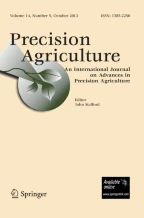Abstract
Protein content, which represents rice taste quality, must be estimated in order to create a harvesting plan as well as next year’s basal dressing fertilizer application plan. Ground-based hyperspectral imaging with high resolution (1 × 1 mm per pixel) was used for estimating the protein content of brown rice before harvest. This paper compares the estimation accuracy of rice protein content estimation models generated from the mean reflectances of five regions of interest (ROIs): the overall target area, dark area (less illuminated parts of the rice plants), canopy area (leaves, yellow leaves, and ears), leaf area, and ear and yellow leaf area. The size of the target sampling area was 0.85 × 0.85 m. An R + G + B histogram and a GNDVI–NDVI image were used to separate the target area into the individual ROIs. The values of the coefficient of determination R 2 and the root mean square error of prediction (RMSE) were similar for each model: R 2 ranged from 0.83 to 0.86 and RMSE ranged from 0.27 to 0.30% for all models except for the dark area model, where R 2 = 0.76 and RMSE = 0.35%. There were no significant differences in the magnitude of the estimation error among all models. This result indicates that it is not necessary to obtain an image with a ground resolution that is greater than 0.85 × 0.85 m per pixel to estimate rice protein content before harvest. This result should provide useful information when deciding the altitude of platforms for imaging rice fields.
Similar content being viewed by others
References
Asaka, D., & Shiga, H. (2003). Estimating rice grain protein contents with SPOT/HRV data acquired at maturing stage. Journal of the Remote Sensing Society of Japan, 23(5), 451–457.
Cheng, W., Zhang, G., Zhao, G., Yao, H., & Xu, H. (2003). Variation in rice quality of different cultivars and grain positions as affected by water management. Field Crops Research, 80(3), 245–252.
Honkavaara, E., Saari, H., Kaivosoja, J., Pölönen, I., Hakala, T., Litkey, P., et al. (2013). Processing and assessment of spectrometric, stereoscopic imagery collected using a lightweight UAV spectral camera for precision agriculture. Remote Sensing, 5(10), 5006–5039. https://doi.org/10.3390/rs5105006.
Ishiguro, E., Kumar, M. K., Hidaka, Y., Yoshida, S., Sato, M., Miyazato, M., et al. (1993). Use of rice response characteristics in area estimation by LANDSAT/TM and MOS-1 satellites data. ISPRS Journal of Photogrammetry and Remote Sensing, 48(1), 26–32.
Ishii, K., & Katano, M. (2008). Growth diagnosis of yield and protein content of brewery’s rice “Yamada-nishiki” by the SPAD value of leaf blade. Report of the Kyushu Branch, Crop Science Society of Japan, 74, 27–30.
Matsue, Y. (1995). Studies on palatability of rice in Northern Kyushu. V: Influence of abnormal weather in 1993 on the palatability and physicochemical characteristics of rice. The Crop Science Society of Japan, 64(4), 709–713.
Matsue, Y., Mizuta, K., Furuno, K., & Yoshida, T. (1991). Studies on palatability of rice grown in Northern Kyushu. II. Effects of harvest time on palatability and physicochemical properties of milled rice. Japanese Journal of Crop Science, 60(4), 497–503.
Onoyama, H., Ryu, C., Suguri, M., & Iida, M. (2011). Estimation of rice protein content using ground-based hyperspectral remote sensing. Engineering in Agriculture, Environment and Food, 4(3), 71–76.
Osten, D. W. (1988). Selection of optimal regression models via cross-validation. Journal of Chemometrics, 2(1), 39–48.
Ozaki, K., Kobayashi, T., Ohashi, Y., & Kawase, K. (2012). Establishment of predict method to regulate desirable spikelet numbers and protein contents by growth diagnosis production, and application to ‘Koshihikari’ cultivated in Tango Area, Kyoto Prefecture. Bulletin of the Agriculture and Forestry Technology Department, Kyoto Prefectural Agriculture, Forestry and Fisheries Technology Center. Agriculture Section, 35, 1–10.
Ryu, C., Iida, M., Nishiike, Y., & Umeda, M. (2005). Influence of several doses of nitrogen fertilizer on rice taste and grain yield. Journal of the Japanese Society of Agricultural Machinery, 67, 55–61.
Ryu, C., Suguri, M., Iida, M., Umeda, M., & Lee, C. (2011). Integrating remote sensing and GIS for prediction of rice protein contents. Precision Agriculture, 12(3), 378–394.
Turner, D., Lucieer, A., Malenovsky, Z., King, D. H., & Robinson, S. A. (2014). Spatial co-registration of ultra-high resolution visible, multispectral and thermal images acquired with a micro-UAV over Antarctic moss beds. Remote Sensing, 6(5), 4003–4024. https://doi.org/10.3390/rs6054003.
Uto, K., & Kosugi, Y. (2013a). Estimation of Lambert parameter based on leaf-scale hyperspectral images using dichromatic model-based PCA. International Journal of Remote Sensing, 34(4), 1386–1412.
Uto, K., & Kosugi, Y. (2013b). Leaf parameter estimation based on leaf scale hyperspectral imagery. IEEE Journal of Selected Topics in Applied Earth Observations and Remote Sensing, 6, 699–707.
Uto, K., Seki, H., Saito, G., & Kosugi, Y. (2013). Characterization of rice paddies by a UAV-mounted miniature hyperspectral sensor system. IEEE Journal of Selected Topics in Applied Earth Observations and Remote Sensing, 6(2), 851–860. https://doi.org/10.1109/JSTARS.2013.2250921.
Vigneau, N., Ecarnot, M., Rabatel, G., & Roumet, P. (2011). Potential of field hyperspectral imaging as a non destructive method to assess leaf nitrogen content in Wheat. Field Crops Research, 122(1), 25–31.
Ye, X., Sakai, K., Okamoto, H., & Garciano, L. O. (2008). A ground-based hyperspectral imaging system for characterizing vegetation spectral features. Computers and Electronics in Agriculture, 63(1), 13–21.
Acknowledgments
This work was partially supported by Nantan City and the Research Grants for Japan Society for the Promotion of Science Postdoctoral Fellows (21-09333). We are grateful to Professor Tatsuya Inamura of Kyoto University of Agriculture Sciences for assistance with the experiments.
Author information
Authors and Affiliations
Corresponding author
Rights and permissions
About this article
Cite this article
Onoyama, H., Ryu, C., Suguri, M. et al. Estimation of rice protein content before harvest using ground-based hyperspectral imaging and region of interest analysis. Precision Agric 19, 721–734 (2018). https://doi.org/10.1007/s11119-017-9552-3
Published:
Issue Date:
DOI: https://doi.org/10.1007/s11119-017-9552-3
